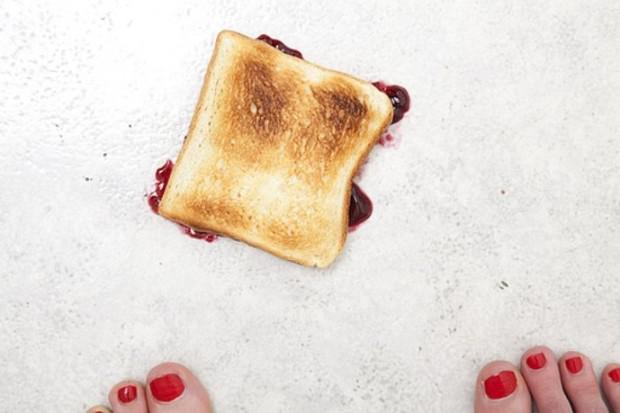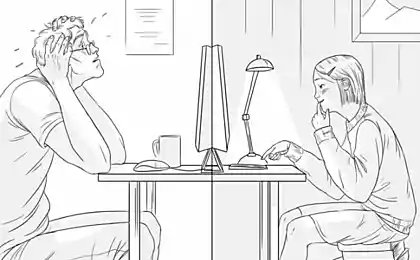865
10 major studies that give answers to the most unexpected questions
Languages - sila
How did the universe? Is there an effective cure for cancer? How can I get cheap clean energy? These are just some of the pressing questions asked by scientists. But there are guys who had a nice time and have received a good salary, answering the specific questions that no one else was interested.
1. Whose fleas jump higher - a cat or a dog? In the eternal war between the "dog lovers" and "cat owner" no details, in particular, it is important to know whose fleas jump higher. In 2000 a group of courageous scientists from the National Veterinary School in Toulouse decided to close this gap in the knowledge of mankind once and for all.

Armed with a plastic tube and a bunch of funny fleas, researchers have started to work. They put each type of flea - Ctenocephalides felis (cat flea) and Ctenocephalides canis (dog flea) in separate test tubes and count how many fleas could jump. First, the height of the pipe does not exceed a centimeter, but then gradually increased.

Dog fleas won: on average, they jump to a height of 15, 5 cm, and the cat flea - only 13, 2 cm. The dog flea-champion jumped by 25 cm, and the cat - only 17 cm.
But this is only the beginning: in 2003, a team of other researchers brave decided to compare seven different species of fleas ... classified information.
2. Appear if objects less when tilted to the left? 83,825,730
Have you ever wondered like, "Do I Seem less than the high-rise building, if I leaned a little to the left?" Probably not. For this purpose we have and scientists - they answer questions to which we ourselves would never have guessed.
Wise men from the Erasmus University in Rotterdam come up with a way to find the answer. They invited the 91 th student, put them on the «Wii Balance Board» (this is a game controller for the console) and the young people were asked to evaluate different quantitative values ranging from urban population to the height of buildings. Unbeknownst to the students, researchers managed to board members to or stood straight or bent slightly to the left or right when making their estimates.

Hypothesis investigators was the fact that we usually visualize numbers in accordance with the invisible line is the smallest number of large number of left and right. Thus, if we are inclined to the left, it is natural for us to think about a smaller number of anything.
This may sound like a five-year logic of your nephew, but the truth is there. The study confirmed that the assessment of those "clones" of the left, were smaller than those of other participants. The experiment is also likely to reveal the least interesting way to take advantage of «Wii Balance», but these conclusions in the final report, alas, no.
3. What is the power needed to keep the sheep on the table with the haircut? 88,133,035
Sostriganie wool sheep - no less dangerous business than any other. If you're not careful, you can accidentally trimming a my fingers, or sheep can rush to the defense of their wool. And yet the sheep and strive to go somewhere at this time to leave the table, where they were placed for a hairstyle. How to keep it? That's the thing.
Australian researchers in the year 2002 decided to answer this question. Many sheep (and their owners) are injured during the haircut, so that a question has just been relevant.
Were invited to participate eight experienced shearers, also participated in the study five sheep, though not willingly. Shearers had to lock the sheep on three surfaces - steel, wood and plastic. Also surfaces are inclined at different angles to measure the expended sheep fixation force.
According to the study, the best surface for fixing the sheep - a wooden, slightly tilted and rough. The force required to lock the sheep in this case is 359 Newtons, which is 15% less than in the cases with other surfaces.
4. Why woodpeckers do not have a headache? 91,274,010
Woodpeckers are known for their ability to gather food from the bark of trees, and his maniacal laughter contagious. But as they in their way of life is avoided migraine has long been completely incomprehensible - they hit a tree beak 20 times per second.
Therefore, in 2011, scientists decided to understand why woodpeckers do not have brain injuries. They filmed the birds on the camera and measured the force of their blows by using ultra-sensitive sensors and analyzed the structure of the head of a woodpecker.
The researchers found that brain injury does not arise because of the morphology of the skull bones and beak. It turns out that bird, produce their own food, hitting its beak on a hard surface, ideally suited for this purpose. Who would have thought?
5. Can people walk on water?
When we hear that Jesus walked on the water, react in different ways believers call it a miracle, the skeptics - a farce, and some researchers decided to test whether it is a scientific fact.
In 2003, a group of five European researchers set up an experiment - they simulated how the water run for some species of lizards. First lizards had to do, because in normal circumstances people are not able to move fast enough to avoid breaking the water surface and dive into the water - we're just too heavy. But what if a little "pokoldovat" over the laws of gravity?
The researchers used a cunning device of safety belts and child pool: participants supported belts, started just above the pool and tried to run on water.
In the end, the study revealed that, theoretically, people can walk on water. Not on Earth, where gravity is 10% of the Earth - say, on Pluto. However, there is no water. But anyway, all you need to walk on water - it's a good physical preparation and other planets.
6. What food flavorings prefer horse? 32,004,033
Horses, like people, not all products are equally popular. For example, carrots taste significantly different from petroleum jelly, petrolatum and the horse is unlikely to be there. And some dedicated people have found it necessary to determine the exact taste preferences of horses.
In 2005, three (do not laugh) British researchers conducted a series of scrutiny: to feed eight to madness must have happy horses meal with various spices.
At first it was tested 15 fragrances. Researchers recorded how fast the horse ate food with these flavors and how much food they had left untouched. Then the scientists gave the horses to choose from, two of the most preferred "food" to finally find out which of them tastier.
So, thanks to these dedicated guys we have rated the taste preferences of horses. Record: fenugreek, banana, cherry, rosemary, cumin, carrot, peppermint and oregano. Oh, it's definitely something everyone should know the modern man!
7. Do people swim faster in water than in syrup? 28,285,991
The answer seems obvious: sticky and viscous syrup for swimming is definitely not suitable. But science can not be based on assumptions! All need to be confirmed experimentally.
In 2004, a pair of researchers has created a test environment: in full water pool depth of 25 meters was poured food thickener - guar gum. As a result, a thick fluid twice as dense as water. She looked like snot (excuse).
The most difficult part of the experiment was, as usual, red tape - it took 22 permits from different authorities. Well, just generally do not allow anyone to throw into the pool some strange substance. But that does not make for the sake of science ...
Surprisingly, it found 16 volunteers found it easier to light. These 16 people at a time tried to swim in the "snot" and research has shown that there is a difference of water: in the water, and people floating in syrup with about the same speed.
When swimming in syrup swimmers really have to overcome more resistance. But at the same time allowing the syrup to lighten up when moving forward - a dense liquid serves as an additional support. So the answer is not always as obvious as it seems.
8. Prefer whether chickens beautiful people? 13,809,033
For most of us chickens look the same, and to judge their attractiveness, we can not. Surely hens and to our external data does not care. But, as you know, someone that question did not give sleep.
Researchers from Stockholm University especially trained six chicks (three male and three female) to distinguish human faces. Roosters were fed when pecked photograph of a woman, and chicken - when pecking photo men. I must say that distinguish between men and women, these six birds have learned pretty quickly.
And then it began the most interesting: the first two pictures have generated more five people, and then the researchers asked the students to evaluate what kind of person they seem the most attractive. Then came the turn of chickens to make their choice.
Chickens assess the attractiveness of people almost as much as the students. Well, our attractiveness can appreciate even trained chickens - and that is good.
9. Is it always falls butter side down a sandwich? 16,596,618
Almost everyone knows about the law Murphy, if something can go wrong, it will happen. If it's only one pool, then you step right into it. If you choose to turn in the supermarket, it will move slowest. If you drop a sandwich, it always falls butter side down.

Most people will decide that this is due to the fact that the side with the heavier oils. But Robert Matthews, a British scholar and journalist, set out to prove that the law Murphy actually works - at least in respect of the sandwich. In 1996, Matthews was published theoretical work on the subject, which was awarded the Ig Nobel prize.
In 2000, Matthews was finally able to test the hypothesis in practice across the UK students were asked to give up their sandwiches on the floor and write down what they have fallen down. The results are striking: 62% of sandwiches fall butter side down, and such a high percentage of coincidences can not be explained by chance.
Further tests showed that the oil has nothing to do with it - much more influenced by the height of the table, where falls sandwich. For example, from Table 2 above, 4m bread with equal probability falls down both sides. The fact that the incidence of low height in sandwich no chance to make a full turn in the air. Thus, the law Murphy performed due to the fact that we have such a low, not because oil is heavy.
10. What is the probability that the soldiers at the dislocation happens constipation? 92,868,071
When the soldiers are on foreign soil, they often experience a lot of stress - they have to constantly stay on high alert in case of emergency. Studies show that the digestive system is also experiencing a soldier with the strongest stress.
In 1993, this issue was carefully studied by 500 marines stationed in another area. Respondents were asked to keep track of your successes and failures in the toilet and fill out the form. We had to figure out where the soldiers often happens constipation - on foreign soil or at home.
Yes, to combat constipation in men occurs about five times more often than at home. The benefits of the research is unquestionable - now in the medicine cabinet each soldier (at least in the US) is a laxative.
via factroom.ru

How did the universe? Is there an effective cure for cancer? How can I get cheap clean energy? These are just some of the pressing questions asked by scientists. But there are guys who had a nice time and have received a good salary, answering the specific questions that no one else was interested.
1. Whose fleas jump higher - a cat or a dog? In the eternal war between the "dog lovers" and "cat owner" no details, in particular, it is important to know whose fleas jump higher. In 2000 a group of courageous scientists from the National Veterinary School in Toulouse decided to close this gap in the knowledge of mankind once and for all.

Armed with a plastic tube and a bunch of funny fleas, researchers have started to work. They put each type of flea - Ctenocephalides felis (cat flea) and Ctenocephalides canis (dog flea) in separate test tubes and count how many fleas could jump. First, the height of the pipe does not exceed a centimeter, but then gradually increased.

Dog fleas won: on average, they jump to a height of 15, 5 cm, and the cat flea - only 13, 2 cm. The dog flea-champion jumped by 25 cm, and the cat - only 17 cm.
But this is only the beginning: in 2003, a team of other researchers brave decided to compare seven different species of fleas ... classified information.
2. Appear if objects less when tilted to the left? 83,825,730
Have you ever wondered like, "Do I Seem less than the high-rise building, if I leaned a little to the left?" Probably not. For this purpose we have and scientists - they answer questions to which we ourselves would never have guessed.
Wise men from the Erasmus University in Rotterdam come up with a way to find the answer. They invited the 91 th student, put them on the «Wii Balance Board» (this is a game controller for the console) and the young people were asked to evaluate different quantitative values ranging from urban population to the height of buildings. Unbeknownst to the students, researchers managed to board members to or stood straight or bent slightly to the left or right when making their estimates.

Hypothesis investigators was the fact that we usually visualize numbers in accordance with the invisible line is the smallest number of large number of left and right. Thus, if we are inclined to the left, it is natural for us to think about a smaller number of anything.
This may sound like a five-year logic of your nephew, but the truth is there. The study confirmed that the assessment of those "clones" of the left, were smaller than those of other participants. The experiment is also likely to reveal the least interesting way to take advantage of «Wii Balance», but these conclusions in the final report, alas, no.
3. What is the power needed to keep the sheep on the table with the haircut? 88,133,035
Sostriganie wool sheep - no less dangerous business than any other. If you're not careful, you can accidentally trimming a my fingers, or sheep can rush to the defense of their wool. And yet the sheep and strive to go somewhere at this time to leave the table, where they were placed for a hairstyle. How to keep it? That's the thing.
Australian researchers in the year 2002 decided to answer this question. Many sheep (and their owners) are injured during the haircut, so that a question has just been relevant.
Were invited to participate eight experienced shearers, also participated in the study five sheep, though not willingly. Shearers had to lock the sheep on three surfaces - steel, wood and plastic. Also surfaces are inclined at different angles to measure the expended sheep fixation force.
According to the study, the best surface for fixing the sheep - a wooden, slightly tilted and rough. The force required to lock the sheep in this case is 359 Newtons, which is 15% less than in the cases with other surfaces.
4. Why woodpeckers do not have a headache? 91,274,010
Woodpeckers are known for their ability to gather food from the bark of trees, and his maniacal laughter contagious. But as they in their way of life is avoided migraine has long been completely incomprehensible - they hit a tree beak 20 times per second.
Therefore, in 2011, scientists decided to understand why woodpeckers do not have brain injuries. They filmed the birds on the camera and measured the force of their blows by using ultra-sensitive sensors and analyzed the structure of the head of a woodpecker.
The researchers found that brain injury does not arise because of the morphology of the skull bones and beak. It turns out that bird, produce their own food, hitting its beak on a hard surface, ideally suited for this purpose. Who would have thought?
5. Can people walk on water?
When we hear that Jesus walked on the water, react in different ways believers call it a miracle, the skeptics - a farce, and some researchers decided to test whether it is a scientific fact.
In 2003, a group of five European researchers set up an experiment - they simulated how the water run for some species of lizards. First lizards had to do, because in normal circumstances people are not able to move fast enough to avoid breaking the water surface and dive into the water - we're just too heavy. But what if a little "pokoldovat" over the laws of gravity?
The researchers used a cunning device of safety belts and child pool: participants supported belts, started just above the pool and tried to run on water.
In the end, the study revealed that, theoretically, people can walk on water. Not on Earth, where gravity is 10% of the Earth - say, on Pluto. However, there is no water. But anyway, all you need to walk on water - it's a good physical preparation and other planets.
6. What food flavorings prefer horse? 32,004,033
Horses, like people, not all products are equally popular. For example, carrots taste significantly different from petroleum jelly, petrolatum and the horse is unlikely to be there. And some dedicated people have found it necessary to determine the exact taste preferences of horses.
In 2005, three (do not laugh) British researchers conducted a series of scrutiny: to feed eight to madness must have happy horses meal with various spices.
At first it was tested 15 fragrances. Researchers recorded how fast the horse ate food with these flavors and how much food they had left untouched. Then the scientists gave the horses to choose from, two of the most preferred "food" to finally find out which of them tastier.
So, thanks to these dedicated guys we have rated the taste preferences of horses. Record: fenugreek, banana, cherry, rosemary, cumin, carrot, peppermint and oregano. Oh, it's definitely something everyone should know the modern man!
7. Do people swim faster in water than in syrup? 28,285,991
The answer seems obvious: sticky and viscous syrup for swimming is definitely not suitable. But science can not be based on assumptions! All need to be confirmed experimentally.
In 2004, a pair of researchers has created a test environment: in full water pool depth of 25 meters was poured food thickener - guar gum. As a result, a thick fluid twice as dense as water. She looked like snot (excuse).
The most difficult part of the experiment was, as usual, red tape - it took 22 permits from different authorities. Well, just generally do not allow anyone to throw into the pool some strange substance. But that does not make for the sake of science ...
Surprisingly, it found 16 volunteers found it easier to light. These 16 people at a time tried to swim in the "snot" and research has shown that there is a difference of water: in the water, and people floating in syrup with about the same speed.
When swimming in syrup swimmers really have to overcome more resistance. But at the same time allowing the syrup to lighten up when moving forward - a dense liquid serves as an additional support. So the answer is not always as obvious as it seems.
8. Prefer whether chickens beautiful people? 13,809,033
For most of us chickens look the same, and to judge their attractiveness, we can not. Surely hens and to our external data does not care. But, as you know, someone that question did not give sleep.
Researchers from Stockholm University especially trained six chicks (three male and three female) to distinguish human faces. Roosters were fed when pecked photograph of a woman, and chicken - when pecking photo men. I must say that distinguish between men and women, these six birds have learned pretty quickly.
And then it began the most interesting: the first two pictures have generated more five people, and then the researchers asked the students to evaluate what kind of person they seem the most attractive. Then came the turn of chickens to make their choice.
Chickens assess the attractiveness of people almost as much as the students. Well, our attractiveness can appreciate even trained chickens - and that is good.
9. Is it always falls butter side down a sandwich? 16,596,618
Almost everyone knows about the law Murphy, if something can go wrong, it will happen. If it's only one pool, then you step right into it. If you choose to turn in the supermarket, it will move slowest. If you drop a sandwich, it always falls butter side down.

Most people will decide that this is due to the fact that the side with the heavier oils. But Robert Matthews, a British scholar and journalist, set out to prove that the law Murphy actually works - at least in respect of the sandwich. In 1996, Matthews was published theoretical work on the subject, which was awarded the Ig Nobel prize.
In 2000, Matthews was finally able to test the hypothesis in practice across the UK students were asked to give up their sandwiches on the floor and write down what they have fallen down. The results are striking: 62% of sandwiches fall butter side down, and such a high percentage of coincidences can not be explained by chance.
Further tests showed that the oil has nothing to do with it - much more influenced by the height of the table, where falls sandwich. For example, from Table 2 above, 4m bread with equal probability falls down both sides. The fact that the incidence of low height in sandwich no chance to make a full turn in the air. Thus, the law Murphy performed due to the fact that we have such a low, not because oil is heavy.
10. What is the probability that the soldiers at the dislocation happens constipation? 92,868,071
When the soldiers are on foreign soil, they often experience a lot of stress - they have to constantly stay on high alert in case of emergency. Studies show that the digestive system is also experiencing a soldier with the strongest stress.
In 1993, this issue was carefully studied by 500 marines stationed in another area. Respondents were asked to keep track of your successes and failures in the toilet and fill out the form. We had to figure out where the soldiers often happens constipation - on foreign soil or at home.
Yes, to combat constipation in men occurs about five times more often than at home. The benefits of the research is unquestionable - now in the medicine cabinet each soldier (at least in the US) is a laxative.
via factroom.ru






















